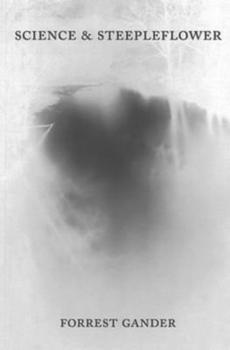Science & Steepleflower (New Directions Paperbook)
His poetry has been called "desperately beautiful" by Thom Gunn in Agni Review, and "original and fascinating" by John Ashbery. With poems in the leading journals of the day -- American Poetry Review, Grand Street, Conjunctions, The Boston Review, to name just a few -- Gander plumbs the erotic depths of human interaction with the land. The poems in Science & Steepleflower test this relationship with what Publisher's Weekly has called "an inbred (and often haunting) spirituality", bringing us to new vistas of linguistic and perceptive grace.
Format:Paperback
Language:English
ISBN:0811213811
ISBN13:9780811213813
Release Date:May 1998
Publisher:New Directions Publishing Corporation
Length:88 Pages
Weight:0.38 lbs.
Dimensions:0.3" x 6.2" x 7.9"
Related Subjects
PoetryCustomer Reviews
2 ratings
"The audacious originality of the ordinary..."
Published by Thriftbooks.com User , 24 years ago
I've thought and thought (in a sort of diffuse, even off-handed way) about what it means to have epiphany and/or transformation occur in a poem. This morning, reading Forrest Gander's "Science & Steepleflower," I realized that I was "reading" along a rocky, bouldered watercourse. It was like experiencing manifestations of "other" inside the confining condition of being "other," or "manifest," oneself. Or, like trying to see red with a red gel (mylar film) one one's eyeglasses. I drowsed for a moment after swirling inside Gander's poem "Sinister," and I dreamed a recipe. On waking, I couldn't remember the recipe itself, but only the feeling of having "arrived" at a final result, a beautiful, culminating dish. Take an ingredient (by itself insipid) and another ingredient (well, a little interesting, but hardly remarkable as a single taste), and fold and stir and mix and heat and grill and broil and voila! we arrive at the epiphanal, transformational, alchemical dish...like no other, and born of enacting step-by-step procedures. A recipe is an agenda. The resulting dish is the final distinction. "As if a distinction might be drawn at the end of a continuum." (from "Duration and Simultaneity")I don't experience the poetry of Science and Steepleflower, however, as having "arrived," as having reached any particular point along a continuum. Rather, as in Picasso's portraits, these poems look at "reality" from multiple perspectives, and simultaneously. That activitiy is, in itself, the epiphany or transformation for the writer/reader. In ordinary states of consciousness, we tend to take single perspectives, consider singular events, singular meanings, and generally come down on one side or another of a dialectic. We are rarely content to hover in potentiality, possibility, and contingency, more often wanting resting places of synthesis, resolution, articulated meaning that takes on the gloss of fact. As Gander says in "Knife on a Plate," "A donkey finds a magic pebble. The referents / for the story's terms / are a function of the story itself, / and the boy knows there is no one world / we approach by approximations. // Only choose and choose and choose / cracks over us. I jolt awake- / but no time has passed".So, how do we hear and see the world through all of our own racket and clutter, our own noise and debris? I listen to this uncanny phrase from "Duration and Simultaneity": "The cicada collapses its own eardrum, blocking out / its own song or goes deaf" and realize that this is (often) how I go through my own life. The double-bind is that by shutting down "self-perception," I shut down "other-perception," unlike the cicada, who appears to have a more selective eardrum! I (often) imagine that my own "song" and the "song" of everything/everyone else are distinct, even autonomous entities...when in fact, they are enmeshed in a matrix of sameness and only pop out into a sort of "on-off, yes-no
"...the plum side/not facing us but richer/In contingency.."
Published by Thriftbooks.com User , 26 years ago
I think of Holderlin's line in "Bread and Wine': "...and what are poets for in a destitute time?" and think to myself "THIS, this is what poets are for." Yes, there is that "inbred (and often haunting) spirituality, bringing new vistas of linguistic and perceptive grace" that is promised on the blurb on the back of the book, but so much more, in these poems "I hear the black tongues crawling my forearm/called by your voice, your cool matutinal warbling, to enrich/my hearing with another hearing." This is a poetry that goes into the bone and needles the marrow out of its sleep crawl. It *thrums*





